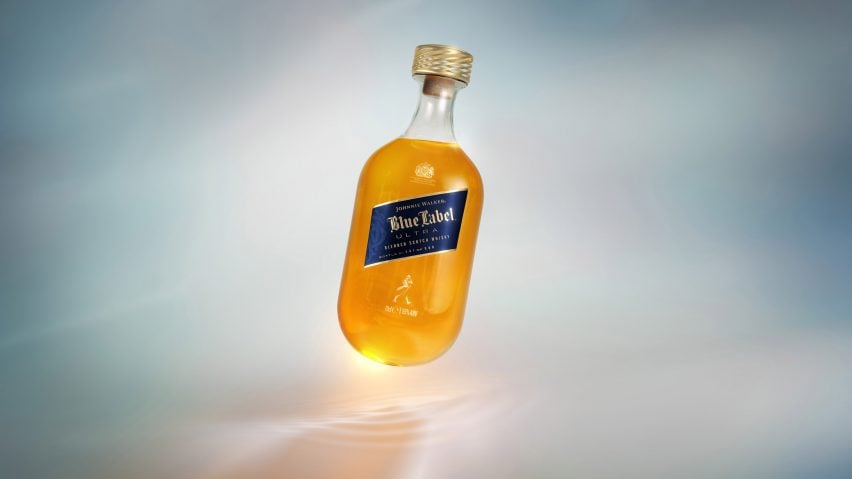Beverage company Diageo has produced what it believes is the world's lightest standard-sized glass spirits bottle for its Johnnie Walker Blue Label Ultra whisky, launching next week at the London Design Festival.
Where a typical 700-millilitre bottle spirits bottle weighs around 500 grams, the special-edition Johnnie Walker bottle weighs just 180 grams without a lid, and was made in a quest to reduce the carbon emissions from packaging.
The hand-blown bottle has an adapted teardrop shape, with a rounded bottom and concave neck, but at the same time it echos aspects of Diageo's recognisable Johnnie Walker bottles in its slightly squared-off sides and shoulder.
Diageo global design director Jeremy Lindley told Dezeen that the project was born out of an ideation session on the future of luxury, where the team identified an emerging trend prizing lightness and sustainability over extravagance.
"We thought, what if our luxury products, instead of being in the heaviest glass, they were in the lightest and they celebrated beauty and delicacy?" he said.
His team then pursued a "test-and-learn" approach to develop the bottle, working with glassblowers to explore what shapes and techniques allowed for the use of the least amount of glass without the object breaking.
The artisans advised that the most effective strategy would be to follow the natural, balloon-like shape the glass takes when it comes out of the furnace and is acted on by gravity.
This creates a more even distribution of glass that counters the weakness in standard moulded glass bottles – that extra material has to be used in order to compensate for where the glass is thinnest.
This weak point is where the base meets the edge, forming a right angle, and because the material can't be precision-targetted to fill just that particular spot in a mould, the quantity of glass used overall has to be increased.
"You have to make glass thick enough to be strong enough at its thinnest point, and you can't control where glass goes in a mould," said Lindley.
"Most glass bottles are heavier than they need to be in nine-tenths of the shape in order to be strong enough at the weakest point."
From this starting point, Lindley's team worked to gently modify the shape to evoke the standard Johnnie Walker bottle, eventually moving to technical analysis and 3D modelling, and partnering with Turkish glass company Şişecam to get to the finished hand-blown product.
Throughout, the rounded teardrop base remained a non-negotiable for lightness. Lindley says the bottle can still stand up, but not reliably so – hence the development of a protective bamboo "cage" for the bottle's presentation.
Bamboo was chosen as a renewable material that is both strong and light – added to the 180-gram bottle, the packaging still doesn't outweigh a standard glass bottle.
It also scores better on Diageo's internal carbon impact assessment, as most of the carbon emissions from glass packaging are created in its production in high-heat furnaces, rather than through transport or other means.
The company says that, based on calculations by British Glass, every gram of glass reduction means over half a gram less carbon emissions in production.
The lightweight bottle needs to be handmade and hand-filled, so it is not currently a solution at scale, but Lindley says Diageo is applying lessons from the project to its mass-produced bottles.
It is also allowing royalty-free use of its patent so that other companies can apply and learn from the same process.
Johnnie Walker Blue Label Ultra is being released in a limited edition of 888 sold at £1,000, and will be launched at the London Design Festival with an installation called Liquid Light by Marshmallow Laser Feast at the Old Selfridges Hotel in Marylebone.
Lindley will also host three technical briefings on the project at the same location during the week.
Other events at this year's festival include an exhibition exploring the meaning of the term "well-made" and the multi-storey, plant-filled Vert installation by Stefan Diez.
Lindley's briefings will take place at Liquid Light on Tuesday 17 September at 12pm, Wednesday 18 September at 3pm and Thursday 19 September at 1pm. See our London Design Festival 2024 guide on Dezeen Events Guide for information about the many other exhibitions, installations and talks taking place throughout the week.

